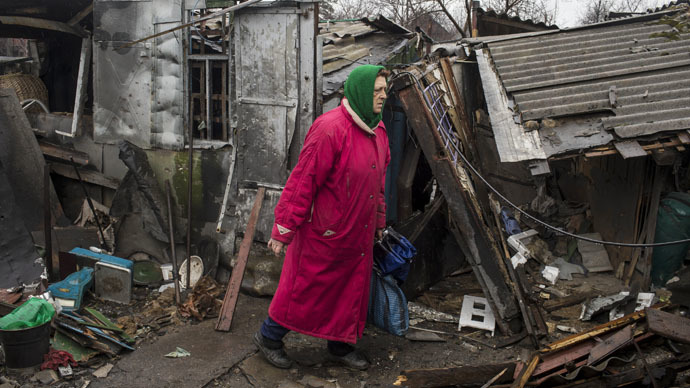'Russia supporting political settlement in Ukraine, Kiev needs to step up to the plate'

As NATO continues its 'counter the bear' approach towards Russia, the truce in Ukraine remains fragile. RT spoke to Konstantin Dolgov, human rights ombudsman for the Russian Foreign Ministry, to discuss what Moscow is doing in the current crisis.
RT:Aren’t you tired of this constant military rhetoric all the time?
Konstantin Dolgov: Frankly, Kevin, there is almost nothing to comment [on] from the human rights perspective. But as a diplomat, I can only reiterate that any actions aimed at fanning even further the military hysteria are counter-productive and [are] definitely highly deplorable. What Europe needs, what our continent needs, is to move along the way of collective security, to strengthen the foundations of collective security – that is what Russia has been persistently advocating. It’s interesting to see, to hear about those precautionary measures which the NATO commanders have been taking. It means they are pretty much aware that the general public is not applauding.
RT:What are the prospects of the fragile truce in Ukraine? Is it going to continue?
KD: Hopefully so. The weakest spot is the lack of political will in Kiev and in some Western capitals which continue to support the Kiev authorities as far as the implementation of the Minsk agreement goes. And the so-called 'party of war' in Kiev is still pretty much strong...unfortunately there have been clashes, there have been violations. Foreign Minister Sergey Lavrov said the other day that if we take the OSCE observers’ reports, for instance, roughly 80 percent of ceasefire violations, according to OSCE observers, have been perpetrated by the Ukrainian army and the so-called ‘volunteer battalions’ who are fighting alongside the Ukrainian army. This is the weakest point – the political will to implement the agreements and to preclude the situation in which we would witness huge casualties, above all among civilians. Let me remind you of the UN figures: more than 6,000 people are dead. In reality, these figures might be much higher.

RT:Are you absolutely convinced that Russia is doing enough to keep its side of the Minsk agreement?
KD: First of all, we are not a side and we are not party to any agreement. We are not party in [the] internal Ukrainian conflict. Secondly, obviously we’ve been supporting and promoting the political settlement. The Russian leadership has been doing a lot. President Putin himself played a more than instrumental role in making the February 12 Minsk agreement happen. Obviously we are doing whatever we can. But the bulk of responsibility lies definitely with the parties themselves. And today, most and foremost, the responsibility is with Kiev because most of the violations come from there.
READ MORE: Five Ukraine war tragedies: Questions unanswered, investigation drawn out
RT:How do you see the violation is still happening on that side?
KD: Absolutely, of course. And if we speak of the military side of agreements, that’s for sure. Let me once again refer to the OSCE monitors. This is not the Russia’s view – this is the OSCE monitors' view, which is [an] impartial factor present there. If we take the political side of it and the humanitarian side of it, definitely the latest decisions by the Ukrainian parliament changed the Minsk agreements dramatically. They actually altered the agreement without the acquiescence of the second party: those decisions on the [local] elections, a declaration which proclaimed the Donetsk and Lugansk areas as occupied territories, and so on. Obviously it’s a deviation from the peace plan and we very much regret about it (sic).
RT:The UK has recently sent military advisers to train Ukrainian personnel, but has not sent lethal armament. If it drags on and the situation gets worse and lethal aid is given to Ukraine, is it dangerous or not?
KD: Well, definitely. We’ve said more than once that any supplies of armaments and military equipment to the Ukrainian government is a factor of huge risk. There is no solid foundation of peace yet. The hostilities definitely stopped on a large scale but the clashes continue and people continue to get killed. Definitely, the numbers are low which is very good. We should not forgive about the decisions taken within the OSCE and also within the European Union which actually preclude and warn against any supplies of arms to the situations of military conflict...
RT:Do you see the OSCE mission as a totally impartial, professional body?
KD: As Minister Lavrov has said, the reports have become more regular, the reports have become more substantive, and evidently the OSCE has been playing an important role. The problem now is to continue to buttress the OSCE mission, to provide equipment. Russia is ready to do what it takes on our part. But it should be a collective endeavor to give equipment, to give technical means for the monitors to be more capable. However, all this is happening against a very negative backdrop, the catastrophic situation in Ukraine as far as human rights are concerned, and the OSCE spends a lot of time on human rights. We should not forget about that side of the story. Ukraine is still a country which has quite a number of political prisoners and political inmates. And this is a big problem. They have not abolished their so called “lustration” law, which has been criticized by the Commission of Venice of the Council of Europe. [Also] not to forget about the lack of investigations into huge crimes in Odessa and Mariupol.












